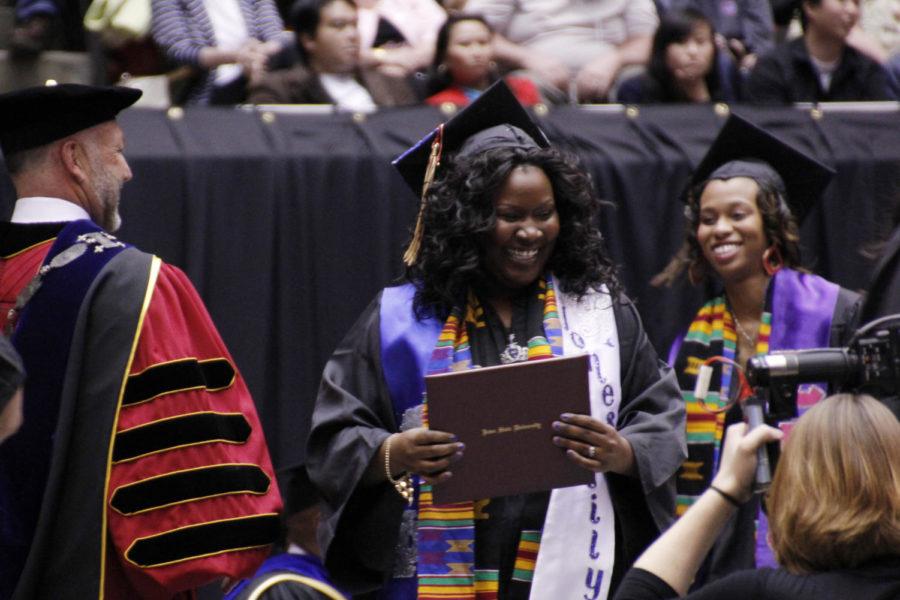Cummings: Graduates face grim future
Photo: Jonathan Krueger/Iowa State Daily
Graduate Ebony Jones receives her degree from President Leath on May 11, 2013.
November 13, 2013
As students reach the end of their years here at Iowa State, one question remains at the front of their minds: What do I do now?
Some students will choose to end their college careers and start right into the workforce and others will take another route, heading on to graduate school and maybe even on to another institution after that.
But with the high costs of tuition and the amount of debt students have already accumulated, near-graduates must now wonder if getting a higher education is even worth it.
Though students holding a bachelor’s degree have half the unemployment rate of those with only a high school diploma, around 11 percent of recent college grads are still job hunting. These figures peaked during the recession and are steadily declining, but is the slow job market recovery going to be enough for this year’s college grads?
The problem lies not in the unemployment rates of college grads, but in what is now being called the “underemployment” rates of college graduates. Underemployment refers to the fact that an increasing amount of people are being forced into working jobs that they are overly qualified for. For instance, the Bureau of Labor and Statistics reported that about 48 percent of employed college graduates are working jobs that require less than the four year degree those graduates just earned.
So what does this say of our current job market? Are college degrees becoming obsolete, or has the poor economy taken its toll on the number of jobs available to graduates? Those in the fields of science or technology have a somewhat promising outlook, with about 75 percent of those jobs requiring a four-year degree. However, students majoring in the social sciences or the arts can only rely on an average of about 50 percent.
However, just because these fields require a degree does not mean that they are currently hiring. Even students attending the nation’s top schools are not immune to the effects of the economy, with 40 percent of their graduates unable to find jobs in their chosen field of study.
With these statistics in mind, it would seem that students are left with few options: don’t attend college and accumulate unnecessary debt, or get a degree and be willing to work jobs you’re overly qualified for outside your field of interest.
Some argue that the disappointment recent college grads feel about the unexpected underemployment trend is just a natural reaction from this generation’s supposed “entitled” mindset. Despite the logic behind wanting to be paid appropriately for our skill sets and wanting to work at a job we just spent the last four years studying for, those of us in the “entitled” generation are supposed to be happy getting a job at all, even if it is at Starbucks.
But the problem with this is that if college graduates are taking low-paying, menial jobs that other people are usually working, then that forces those people who are unqualified for degree-requiring jobs into unemployment as well. The poor job market has created a vicious cycle of unemployment.
So although it may seem to some that our generation feels we are “entitled” to having a certain caliber of job, perhaps it is that we understand our inability to get the jobs we are qualified for affects more than just ourselves.
It is accurate to say that it takes more than possessing a degree to obtain a job, but when employers won’t even consider you unless you have the degree qualifications they’re looking for, and other employers won’t hire you because you have too many qualifications and they’re unwilling to pay you for it, college grads are left wondering if it was even necessary for them to graduate at all.
While I believe students are better off attending college in order to gain a broader knowledge base and skill set, the outlook for job hunting graduates at this time seems fairly grim. Unfortunately, students might have to be content with their minimum wage jobs until something better comes along.
And while I’m not advocating retreating into your parents’ basement to mooch off them until your dream job comes around, I am saying that the sad reality of it is that college graduates who want to stick to their desired career path may have to do just that: stick it out and wait.

















